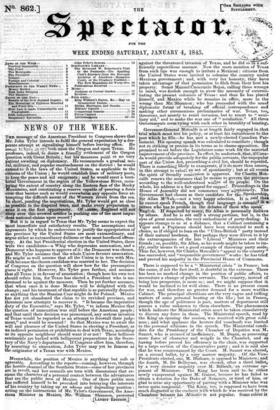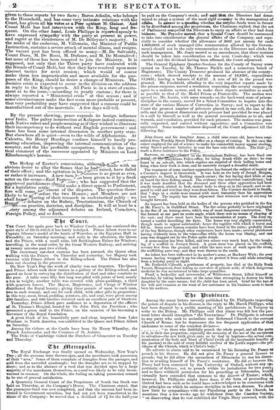Meanwhile, the position of Mexico is anything . but safe or
agr, eeable. According to the reports--Coming, however, through the hostile channel of the Southern States—some of her provincei are in revolt) god her councils are torn with dissensions that as-. sume.the charaeuseRf a personal contest between the adventurers that are the Ellie nleax of Mexico. • One of those public men has suffered self to be provoked into betraying the interests of his country:by taking up an odious and degrading -position acting on the instructions of Mr. Tyler's Gdiernment, the Ame: rican Minister in Atexi60;Mr Wulliam Shannon, protested
'
Against the threatened-inVasioii of Texas, and he did -so in a sufficiently supercilious manner.. Now the mere mention of Texas from such lips was enough to irritate a Melicari : citizens front the United Stateswere invited to colonize the country under -Mexican government ; and, with very lax -honesty', they, have taken advantage. Of that permission to filch from their host his -property. Senor Manuel CreseentiO Rejon, calling those wrongs to mind, was foolish enough to avow the necessity of exterminating the present colonists of Texas : and thus he has placed inmself, and Mexico while he remains in office, more in the mirong than Mr. :Shannon • who has proceeded with the usual diplomatic forms of breaking off official , correspondence and making. other ceremonious preliminaries of war. Texas, too, threatens, net nierely to resist invasion, but to resort to " auxiliaryaid," and to make the war one of 0 retaliation."All three Governments seem vying with each other in brutality of bearing'.
GOvernor-General Metcalfe is at length fairly engaged in that
-trial which must test his policy, or at least his suitableness to the post Which he fills—he has met a newly-elected Canadian Parliament. His opening speech was calculated to conciliate ; though not so Striking or precise in its terms as to shame apposition. Re promised to set before the Legislature some work for the material improVeriaent of the province. In effect, he undertook, that, if Canada would: provide adequately for the public servants, the unpopular part of the-T,Lnion Act,prescribing a civil list, should be repealed. There is something 'likely to exasperate, if it do more than amuse, M.this attempt to extoit an act of spontaneity ; but: at all events
• •
the spirit of friendly cone-Mt on is apparent. Sir Charles Metcalfe renews the assurance thale means to govern the province according to the well-understoOd wiates of its people. On the whole, his address is a fair appeal for sUppoit,,, Proceedings in the House of Assembly did not commence vert G:Overnment had chosen as their candidate or the .§PeakerahiPt Sir Allan Wlsiab,—not a Very happy selection. . It is glat lie cannot speak French, though that language is essentialA at: person who has to preside in the debates of those who speak-. Engl.-h. If respected by many, Sir Allan is personallydislikea by others. And he is not only a strong partisan, but is, in the eyes of great numbers, the very embodiment of party-feeling. It appears strange to us at a 'distance; that a Cabinet containing a Vigor and a Papineau should have been restricted to such a choice, as if obliged to lean on the " Ultra-British " party instead of their natural brethren. But perhaps they were driven to it by the extravagancies of the late " Liberal ' Ministers and their friends ; or, possibly, Sir Allan as his words might be taken to imply, really means to set a good example of throwing party aside. Thus far, however, Sir Charles Metcalfe's "appeal to the country" has succeeded, and "responsible government" works : he has tried and proved his majority in the Provincial House of Commons.
There is supposed to be a " Ministerial crisis" in France ; but
the cause, if not the fact itself, doubtful in the extreme. There has been no marked change in the position of public affairs, to necessitate a change of public servants. The country, instead of beingleis prosperous, is more so ; and we might suppose that it would be inclined to let well alone. There is no present cause for war, and therefore no greater demand for a more warlike Cabinet. The principal alterations are the very vague and trifling matters. of some personal bearing or the like ; but in' France, though the age of politeness is past, matters of deportment still possess a value unknown to them elsewhere. , The phcenomena which indicate the Ministerial crisis must be cumulatively to discern any force in them. The Ministerial speech, read by the Kingon Opening the session, was received with great coldness; and What applause the hearers did 'vouchsafe was limited to. the personal allusions in the speech. . The .Ministerial date for the Presidency of the Chamber of, Deputiei, was M. Sauzet, who is accused of inefficiency, M. Dupin, as,pessessing more force Of character and 'weight in the Chamber, and :as having before proved his efficiency in the chair, was supported by a large section of the Conservative party ' • and it is said also that he was countenanced by the ,Court. M. Sauzet was elected, On a. second ballot, by a very, narrow majority. ,•. Of the Vicat Presidents elected, one, M.-Dufaure, is opposed to Ministers ;.and the .fourth, M. De Belleyme, was elected., after a third by, a Very., slender majority over . M: Bilault,• an extreme op-: ponent of ,Ministers.-The King has been saidto-be either newly exasperated. against ,M: Guizot, because he has failed to obtain a dotation for the Duke Of Neinetirs, or tired of him, or glad to Seize -any opflortunity of pt.t7rtineviith a Minister Who *aa. never quite -congenial. The King,-, too is supposed to have been Much dieguitLd at the coolneavith which he was received by the Chainbers*. Weil& his Mznzstei is not popular. Smug volour bi, given to these reports by two facts ; Baron Athalin, who belonae to the Household, and has some very intimate relations with tine Court, has given all his votes as a Peeragains M: Guizot. And Count Mole has had interviews with the Ring, long and frequent. On the other hand, Louis Philippe is reported openly to have expressed sYmpathy.with. the party at present in power, and regret at the slenderness of M. Be Belleyme's majority. In the midst of the entbarras, M. Villemain, the Minister of Public Instruction, sustains a severe attack of mental illness, and resigns. The vacant post has been offered to many—M. Be Salvandy, Count Daru, M. De Rossi, M. Dufaure, and M. De Montalivet ; but none of those has been tempted to join the Ministry. It is supposed, not only that the Thiers party have coalesced with the friends of Count Mole, but that they have resolved upon more discreet tactics for next session; which would of course Make them less impracticable and more available for the purposes of the King, should he desire a change of Ministers. The decisive crisis is expected to occur in the division on the address in reply to the King's speech. All Paris is in a state of excitement as to the issue,—according to yearly custom ; for there is always reported a "Ministerial crisis" at this season ; and if some circumstances make the fact seem more probable at presents that very probability, may have suggested that a rumour could be manufactured out of the materials. A few days will tell.























































 Previous page
Previous page